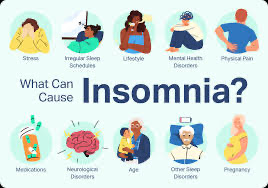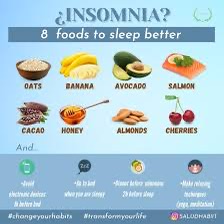Insomnia, holistic tips on how to cope with it!
- Cami Onolfo

- Apr 5, 2024
- 5 min read
Insomnia can take the form of being unable to fall asleep, or waking up during the night and not being able to fall back to sleep.
Insomnia is very frustrating, but it can be only a temporary annoyance.
What is insomnia?
Most cases of insomnia are related to poor sleeping habits, chronic diseases, depression, too much caffeine or lack of exercise.
Chronic insomnia, is usually a symptom of another disorder, such as depression, anxiety, grief, stress, or a variety of physical conditions such as hyperthyroidism, kidney disease, heart problems, asthma, arthritis, indigestion, or simply physical pain, just to name a few.
Other factors include certain medications such as appetite suppressants, antidepressants, anti seizure medications, or jet lag.
A lack of nutrients can also add to the restless nights.
Effects of insomnia
Systemic disorders such as endocrine and digestive system, kidney, liver, pancreas, heart, lungs and neurological system may be affected by this disorder.
One or two sleepless nights may cause irritability, and day time sleepiness with the inability to perform well, is easy to get over, but after the third day, sleep deprivation can cause more serious problems and deterioration in overall performance and can also affect the mood. Chronic fatigue can compromise daily productivity or creates problems in relationships or even start other health problems.
Most people have difficulty sleeping, do to a condition known as restless leg syndrome (RLS). For unknown reasons once an individual lies down in bed to sleep, the legs start jerking, twitching and involuntary kicking. This affliction is linked to the leg muscle cramps. Some researchers believe that a deficiency in magnesium is related to RLS or even anemia, may play in important role in it.
Another condition contributing to Insomnia, is sleep apnea. This condition is mostly found in those suffering from obesity, because their diaphragm cannot fully exert for a full breath. This disorder is associated with snoring and extreme irregular breathing.
Sleep apnea, is characterized by the breathing, which stops for as long as two minutes at a time, while the person is asleep. When breathing stops the oxygen in the blood drops, resulting in oxygen deprivation. In this case a person suffering from sleep apnea could wake up constantly during the night, with every gasping of air. In some less common forms, the diaphragm and chest muscles stop working therefore creating a central sleep apnea.
Individuals suffering from sleep apnea, most of the time suffer from other health conditions such as higher than normal blood pressure, which can lead to strokes. This individuals also can experience a higher than normal incidence in emotional and psychotic conditions. This occurs because the individuals suffering from this disorder cannot arrive to the REM.
What does normal sleep consist off?
Normal sleep consists of two main states rapid eye movement (REM) and non-rapid eye movement (REM)
Stage 1: light sleep, the individual drifts in and out, therefore can be awakened easily. The eyes move slowly and muscle activity slows down.
Stage 2: light sleep. The individuals eye movement stops and the brain waves become slower, with some occasional bursts of movement called sleep spindles.
Stage 3: Deep sleep. Extreme slow brain activity called delta waves appear, interspersed with faster smaller waves.
Stage 4: Deep sleep. The brain starts producing mostly delta waves, no eye movement and no muscle activity.
Stage 5: REM sleep. Breathing becomes irregular more rapid and shallow. The eyes jerk rapidly while the limb muscles become temporarily paralyzed. This is the stage when dreams almost always occur.
Usually it takes about two hours for an individual to go through all five stages, before REM occurs, about 90 minutes after we are asleep.
Infants tend to spend about half their sleeping time in REM sleep.
Older individuals tend to spend less time in delta sleep, and others may not experience it at all.
Children and adolescents, generally require more sleep in order to rest well and perform well.
Tips for cooping with Insomnia
A lack of calcium and magnesium can be the cause of sleepless nights. Calcium and magnesium have a calming effect and relaxes the muscles.
Vitamin B complex helps to promote restful sleep and to relieve stress.
Zinc aids in the recovery of body tissue while asleep. Vitamin C important for reducing stress. Melatonin a natural hormone that promotes sound sleep ( use occasionally)
Valerian root aids in muscle relaxation and calming.
A tea made from California poppy and chamomile, strengthens the nervous system, it is also calming and relaxing.
Other medical plants such as kava kava, skullcap lemon balm also aid in calming and relaxing the body.
1. Establish a Bedtime Routine
- Create a calming pre-sleep routine to signal your body that it's time for rest. Read a book or listen to something relaxing, a story, calming music.
2. Improve Sleep Environment
- Ensure your bedroom is cool, dark, and quiet to promote better sleep.
3. Limit Screen Time
- Avoid electronic devices before bedtime as the blue light can disrupt melatonin production.
4. Practice Relaxation Techniques
- Incorporate techniques like deep breathing, meditation, or gentle yoga before bed to relax your mind and body.
5. Mindful Eating
- Avoid heavy meals, caffeine, and alcohol close to bedtime. Opt for light snacks if needed, such as bananas, dates, figs, yogurt, nut butter, whole grain crackers, grapefruit, tuna and turkey. This foods are high in tryptophan, which help promote sleep.
Do not eat large meals two hours before bed time.
6. Regular Exercise
- Engage in regular physical activity, but avoid vigorous exercise close to bedtime.
7. Limit Naps
- Avoid long daytime naps to ensure you're tired at night.
8. Consult a Healthcare Professional
- If insomnia persists, seek guidance from a healthcare provider or therapist for further evaluation and treatment options.
Conclusion
During sleep period our body systems are still controlling basic functions. Proper nutrition is essential for the body and they are used during the sleep cycle.
A lack of sleep can cause serious diseases and premature aging, one should sleep at least eight hours per night.
Sleep is necessary to restore appetite hormones to their normal state.
The hormonal imbalance women experience during the pré-menstrual syndrome and menopause may trigger insomnia.
Those that snore frequently, should be evaluated for sleep apnea.
Many individuals who suffer from insomnia, resum to taking sleeping pills. Sleeping pills do not cure insomnia and can interfere with REM. Researchers found that those individuals who take sleeping pills become worse, also the persistent use of sleeping pills could lead to dependency and physical or physiological problems. Over the counter pills could cause a wide range of side effects such as confusion, agitation, dry mouth, dizziness, hallucinations, depression and anxiety.
I personally suffer from RLS, I been battling this disorder since childhood. I arrived to terms on coping with it, by using all the tools and resources I wrote about in this blog. Hope you take my holistic approach and lead a good healthy lifestyle and have restful sleep nights.
For more information visit my website and request a consultation.
Your health coach and holistic nutritionist
Cami Onolfo ❤️🙏🏻








Comments